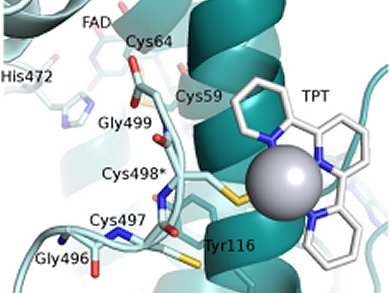Organometallic compounds are widely used in catalytic chemistry, but in terms of their use in drug design, they remain a curiosity. Over the last few years medicinal chemistry research into organometallics has increased significantly, and many reported results indicate a considerable potential for these metal complexes in drug development.
The potent cytotoxic effects of tin organometallic compounds are well known and make them well suited as potential anticancer drug candidates. However, knowledge regarding their mode of action is limited.
A multidisciplinary and international group of research teams coordinated by Ingo Ott, Technische Universität Braunschweig, Germany, has provided evidence that the inhibition of thioredoxin reductase is a contributing factor in the biological effects of tin-based complexes. Virtual screening for thioredoxin reductase inhibitors had indicated this mechanism, which was further confirmed by a combination of synthetic, analytical, and biological chemistry experiments.
These results by Ott and colleagues contribute to a better understanding of the biochemistry of tin organometallics and provide new options for the rational design of improved derivatives.
- Butyltin(IV) Benzoates: Inhibition of Thioredoxin Reductase, Tumor Cell Growth Inhibition, and Interactions with Proteins,
K. Navakoski de Oliveira, V. Andermark, S. von Grafenstein, L. A. Onambele, G. Dahl, R. Rubbiani, G. Wolber, C. Gabbiani, L. Messori, A. Prokop, I. Ott,
ChemMedChem 2013, 8(02).
DOI: 10.1002/cmdc.201200505





chemical effect